by Syarif Hidayat*
 The latest Israeli elections, in which the current PM Benjamin Netanyahu, the head of the Likud-Beiteinu electoral alliance, still got many support, could strengthen the Zionism-Nazism-Apartheid system in the Zionist entity which is far worse than Apartheid South Africa.
The latest Israeli elections, in which the current PM Benjamin Netanyahu, the head of the Likud-Beiteinu electoral alliance, still got many support, could strengthen the Zionism-Nazism-Apartheid system in the Zionist entity which is far worse than Apartheid South Africa.
The Israeli Apartheid policy against the Palestinians and the Zionist Apartheid walls system, that separate the Palestinians with their families, lands and farm fields as well as cut access roads to their neighbors and block many of the Palestinian children paths or ways to their schools, are worse than the South Africans situation during Apartheid years. It is an Apartheid-Zionism-Nazism!
It is worse, not in the sense that apartheid was not an absolutely terrifying system in South Africa, but in the ways in which the Israelis have taken the apartheid system and perfected it, so to speak; sharpened it. Palestinians are mocked in a way that South Africans were not.
“93 percent of the land of Israel (the stolen lands of Palestine) is for exclusively Jewish use. In South Africa, the fact that 13 percent of the population had control of 97 percent of the land. In Israel it is worse.”
 Tanya Reinhart on Israeli apartheid: “Israeli apartheid is trying to get as many Palestinians out of the land as possible … it’s about driving them out of the land.”
Tanya Reinhart on Israeli apartheid: “Israeli apartheid is trying to get as many Palestinians out of the land as possible … it’s about driving them out of the land.”
Also Read: Nuclear Technology: Harm and Benefit from the Qur’anic Perspective
Reverend Allan Boesak on Israeli apartheid:
”It is worse, not in the sense that apartheid was not an absolutely terrifying system in South Africa, but in the ways in which the Israelis have taken the apartheid system and perfected it, so to speak; sharpened it. For instance, we had the Bantustans and we had the Group Areas Act and we had the separate schools and all of that but I don’t think it ever even entered the mind of any apartheid planner to design a town in such a way that there is a physical wall that separates people and that that wall denotes your freedom of movement, your freedom of economic gain, of employment, and at the same time is a tool of intimidation and dehumanisation.”
“We carried passes as the Palestinians have their ID documents but that did not mean that we could not go from one place in the city to another place in the city. The judicial system was absolutely skewed of course, all the judges in their judgements sought to protect white privilege and power and so forth, and we had a series of what they called “hanging judges” in those days, but they did not go far as to openly, blatantly have two separate justice systems as they do for Palestinians [who are tried in Israeli military courts] and Israelis [who are tried in civil, not military courts]. So in many ways the Israeli system is worse.”
“Another thing that makes it even worse is that when we fought our battles, even if it took us a long time, we could in the end muster and mobilise international solidarity on a scale that enabled us to be more successful in our struggle.
The Palestinians cannot do that. The whole international community almost conspires against them. The UN, which played a fairly positive role in the struggle against apartheid in South Africa, takes the disastrous position of not wanting to offend its strong members like the United States who protect Israel.”
Also Read: Gaza Cries Out, the World Stays Silent: A Wounded Humanity
“So even in the UN, where international law ought to be the framework wherein all these things are judged, where international solidarity is not an assumption but is supposed to be the very foundation upon which the UN builds its views on things and its judgements as to which way it goes, the Palestinians don’t even have that.”
“Palestinians are mocked in a way that South Africans were not. In a sense, the UN tried in our case to follow up on its resolutions to isolate the apartheid regime. Here, now, they make resolutions against Israel one after the other and I don’t detect even a sense of shame that they know there is not going to be any follow up.”
”Under Reagan the United States was pretty blatant in its so called constructive engagement program and in its support for the white regime in South Africa, but what the United States is doing now in the week that UNESCO took the decision to support the Palestinian bid for a seat in the United Nations, to withdraw all US financial support; to resort immediately to economic blackmail, that is so scandalous. So in all those ways I think we are trying to say that what is happening in Israel today is a system of apartheid that in its perfection of that system is more terrifying in many ways than apartheid in South Africa ever was,” said Reverend Allan Boesak.
Meanwhile African National Coucil (ANC) Chairperson, Baleka Mbete, said that she has been to Palestine herself and that the Israeli regime is not only comparable but “far worse than Apartheid South Africa.”
Attitudes AND CONFIRMATION in Israel
B’tSelem: “Land Grab”
From Haaretz: “Segregation of Jews and Arabs in 2010 Israel is almost absolute:”
Also Read: Indo Defence Expo and Forum; Sharing Responsibility of Humankind and Environment
 “For those of us who live here, it is something we take for granted. But visitors from abroad cannot believe their eyes: segregated education, segregated businesses, separate entertainment venues, different languages, separate political parties … and of course, segregated housing. In many senses, this is the way members of both groups want things to be, but such separation only contributes to the growing mutual alienation of Jews and Arabs.”
“For those of us who live here, it is something we take for granted. But visitors from abroad cannot believe their eyes: segregated education, segregated businesses, separate entertainment venues, different languages, separate political parties … and of course, segregated housing. In many senses, this is the way members of both groups want things to be, but such separation only contributes to the growing mutual alienation of Jews and Arabs.”
Former Attorney General of Israel Avi Zer-Aviv:
“Despite its best intentions, Israel has created a system of separation in the West Bank which fits the textbook definition of apartheid. According to Michael Ben-Yair, Attorney General of Israel throughout the nineties, “In effect, we established an apartheid regime in the Occupied Territories immediately following their capture. That oppressive regime exists to this day.” He is not alone in asserting this perspective. Many notable Israelis like Meron Benvenisti, Akiva Elder, and Shulamit Aloni, to mention a few, agree that Israeli style apartheid is a reality.”
MANY ISRAELIS SUPPORT APARTHEID-STYLE STATE
Paul Koring in his article titled:”Many Israeli Jews support apartheid-style state, poll suggests” published in The Global Mail Oct. 24 2012, writes according to a poll published in Haaretz, the leading Israeli newspaper, Palestinians should be denied the right to vote if Israel annexes the West Bank and should be required to live separately – in effect creating apartheid-style state.
(Paul Koring (born September 14, 1954 in Montreal) a Canadian journalist and foreign correspondent for The Globe and Mail. He is currently posted to the Washington Bureau as the paper’s foreign affairs and international security correspondent.In 2008, Koring and Graeme Smith, another Globe and Mail correspondent won the 2007 Michener Award for a series of articles detailing the torture and abuse of Afghan detainees captured by Canadian Forces in Afghanistan and transferred to Afghan security forces. The stories forced the Canadian government to repeatedly change and enhance its detainee transfer policy.)
The poll exposes strong support for institutionalized discrimination against Palestinians. But the poll’s questions and terminology, and Haaretz’s publication of it seem intended to stir the emotional debate about the future shape of Israel during an election campaign.
Among key elections issues were vexed issues of a stalled peace process and whether a two-state solution remains viable. Nevertheless, framing issues of separateness and relations between Jews and Arabs in terms of apartheid were seen as emotive, if not inflammatory.
Also Read: Safiya Saeed: From Somali Migrant to First Hijab-Wearing Mayor of Sheffield
The survey used the racially-charged term “apartheid” in seeking respondents’ views about separating populations. In publishing the results, Haaretz noted that the survey firm Dialog acknowledged “perhaps the term ‘apartheid’ was not clear enough to some interviewees.”
Apartheid, an Afrikaans term for forced racial segregation, defined the repressive South African society that treated non-whites as inferior. Whether or not they fully appreciated the nature of the term, Haaretz reported that less than a third of respondents “objected to calling Israel an “apartheid state.’”
Arab-Israelis, about 20-percent of the population, currently have full rights, including the right to vote. However, the Dialog survey found nearly a third of Jewish respondents wanted to take voting rights away from Arabs.
Even more disquieting, “almost half – 47 percent – want part of Israel’s Arab population to be transferred to the Palestinian Authority,” Haaretz said. More than four in ten Jewish respondents said they didn’t want to live in a building with Arab residents or have their children in schools with Arab children.
Also Read: Why Food Safety is Essential During Hajj Services?
The survey, conducted in September 2012 or three months before the elections, interviewed 503 Jewish Israelis. Haaretz didn’t break down the sample’s subsets but did report that the ultra-Orthodox Jews were the most strongly in favour of separating the two peoples.
“The ultra-Orthodox, in contrast to those who described themselves as religious or observant, hold the most extreme positions against the Palestinians,” Haaretz reported, noting that more than two-thirds favour transfer of Palestinians away from Jewish population centers.
Haaretz, Israel’s oldest newspaper which publishes in English and Hebrew usually backs left-wing and secular positions. It acknowledged that the survey “questions were written by a group of academia-based peace and civil rights activists” suggesting that they may have been intended to provoke outrage if – as expected – many conservative and religious respondents endorsed separateness or apartheid.
In an accompanying commentary, Gideon Levy, said the poll “lays bare an image of Israeli society, and the picture is a very, very sick one. Now it is not just critics at home and abroad, but Israelis themselves who are openly, shamelessly, and guiltlessly defining themselves as nationalistic racists.”
Also Read: Indonesia Sign Language Mushaf Qur’an; A Sustainable Gift in Celebrating Pancasila Birthday
Mr. Levy, who has long been controversial for his unflinching reporting from the occupied territories, added: “We’re racists, the Israelis are saying, we practice apartheid and we even want to live in an apartheid state.”
Haaretz said the poll results exposed “anti-Arab, ultra-nationalist views espoused by a majority of Israeli Jews.”
Many Palestinians contend they already live with systemic discrimination both in Israel and in the West Bank where Jewish settlements are linked by a network of special roads and have their own access to scarce water supplies.
Although roughly half of respondents – 48 percent – remain opposed to annexation of the West Bank, nearly 40-percent now back annexation, clear evidence that many Israelis now believe the long-stalled peace process aimed at a two-state solution won’t be successfully revived.
Also Read: Leila Khaled, The Icon of Palestinian Women’s Resistance
Palestinian Ghettos
 Amira Hass in her articles titled: “Palestinian ghettos were always the plan” published in Haaretz, writes that Right-wing politician Naftali Bennett’s plan to annex Israeli-controlled parts of the West Bank is just the logical next step in Israel’s historic effort to ghettoize the Palestinians.
Amira Hass in her articles titled: “Palestinian ghettos were always the plan” published in Haaretz, writes that Right-wing politician Naftali Bennett’s plan to annex Israeli-controlled parts of the West Bank is just the logical next step in Israel’s historic effort to ghettoize the Palestinians.
(Amira Hass (Hebrew: עמירה הס; born 28 June 1956) is an Israeli left-wingjournalist and author, mostly known for her columns in the daily newspaper Ha’aretz. She is particularly recognized for her reporting on Palestinian affairs in the West Bank and Gaza, where she has also lived for a number of years.)
When Habayit Hayehudi party leader and rising political star Naftali Bennett calls for annexing Area C, the part of the West Bank under full Israeli security and civil control, he is following the logic of every single Israeli government: maximize the territory, minimize the Arabs.
Some may even interpret this as elections propaganda in favor of Habayit Hayehudi and endorse it warmly.
Bennett can propose annexation because every governing coalition since the Six-Day War – whether it was led by the Likud or Labor (or its precursor, Alignment) party, and whether its partners were Mafdal, Shas or Meretz – laid the spiritual and policy groundwork for him.
Also Read: The Twilight of the Zionist Israeli State
According to Bennett, about 60 percent of the West Bank – a.k.a. Area C – is annexable. What’s important about Area C is not whether 50,000 Palestinians live there, as democratic, benevolent Bennett claims, while suggesting to naturalize them and grant them Israeli citizenship, or whether the number is around 150,000 (as my colleague Chaim Levinson reminded us earlier this week).
Don’t worry. Even if there are 300,000 Palestinians living in Area C and all of them agree to become citizens, the Israeli bureaucracy will find ways to embitter their lives (the way it does the lives of the Bedouin in the Negev), revoke their citizenship (the way it does the residency status of Palestinians in East Jerusalem) and leave them without the little share of their land they still have (the way it did to the Palestinian citizens of Israel within the 1948 borders). This is why Bennett can allow himself to be munificent.
The true story behind area C is that there aren’t 400,000 Palestinians living there today; the villages have not expanded in accordance with their natural population growth; the number of residents has not grown; the herders can no longer graze their flocks freely; many of the inhabitants lack access to water, electricity, school and medical clinics; Israel has not been taken to the International Criminal Court in the Hague for destroying the cisterns; there are no paved roads in and between villages.
Many of the people have been living in tents and caves for 30 to 40 years – against their will and contrary to their hopes – and the Palestinian towns cannot expand properly and remove old industrial zones a reasonable distance from residential neighborhoods.
Also Read: Prof. Abdul Fatah El-Awaisi and the Intellectual Roadmap for the Liberation of Al-Quds
As I have said a million times and will say another million times: Area C is a tremendous success of Israeli policy and its implementers, the army and the Civil Administration. It is part of a farsighted, well-executed, perfectly thought-out policy that has succeeded precisely in that there aren’t 400,000 Palestinians living in the area. Bennett is probably decent/honest enough to acknowledge the debt he owes to the previous generations of Israeli politicians and military officials who warmed the country up for his annexation plan, ensuring its acceptance would be as effortless as a knife cutting butter in the sun.
Area C existed even before the Oslo negotiators invented the supposedly temporary division in 1995, distinguishing it from Area B, with full Israeli security control and partial policing authority and full civil authority for the Palestinians; and Area A, with full Palestinian civil and policing authority – albeit, as is often unappreciated, within an envelope of full Israeli security control.
When this division was being implemented, the media emphasized the difference between Area A, where armed members of the various Palestinian security forces could operate openly with license from Israel, and the rest of the Palestinian territories, where Palestinians would not be allowed to carry rifles. But in reality, the importance of Palestinian Authority policing powers is dwarfed in comparison with its lack of civilian authority over most of the land.
Area C, then, is shorthand for all the prohibitions that Israel imposes on Palestinian dignity of life, and it has existed before its invention. Live fire zones, military maneuver zones, security belts, fences, state lands, survey lands (where the state is in the process of declaring them as state lands, i.e. only for Jews), re-surveyed lands and post-surveyed lands and nature reserves.
Also Read: Dr. Joserizal Jurnalis: Founder of MER-C and Indonesia’s Humanitarian Icon on the Global Stage
All these were aimed at concentrating them within narrow and meager Pales of Settlement (copyrights reserved for Imperial Russia and its confinement of the Jews). Unlike us, Arabs do not need space, land, resources, water, industrial zones, landscapes or recreational trips.
The Palestinian enclaves are the other side of Area C. Area C, then, is a metaphor for the Israeli ghetto mentality flipped. I usually take care not to use terms like “ghetto” or “concentration camp” to describe the enclaves where Israel has gathered the Palestinians from both sides of the Green Line, or 1948 armistice line, including the Gaza Strip and the slums of East Jerusalem. The 12 years of the Third Reich cemented these terms as links/stations in the conveyor leading to the final goal – a systematic genocide.
In our case, in contrast, ghettoization is itself the aim, having been implemented for the past 65 years. In other words, the aim – unfolded with the advent of time -has been to concentrate the Palestinians in reserves, after most of their land had been robbed of them. And if they desert and move abroad, it’s of their own free will. A direct planning and ideological line stretches between the enclaves in which the Palestinian citizens of Israel live and those of the West Bank and the Gaza Strip.
This is the real Israeli historical compromise. It is not with the Palestinians, but with the dictates of reality and among the various Zionist ideological currents. The crowded, offensive reservations – the creation of which is violence, pure and simple – are a compromise between the craving to eject the Palestinians from their land and the recognition that regional and international conditions do not permit it.
Apartheid, by any other name
 “Are we really as terrible as all that?” asks Gideon Levy, an Israeli journalist in his article titled: “Apartheid, by any other name” published in Haaretz Nov.11, 2012, writes that anyone who tries to draw a comparison between the occupation regime in the territories to the South African apartheid regime – and their number is rising constantly – is instantly labeled anti-Israel and anti-Semitic. But the facts justify the comparison. No, Israel is not an apartheid state, but the occupation in the territories is apartheid.
“Are we really as terrible as all that?” asks Gideon Levy, an Israeli journalist in his article titled: “Apartheid, by any other name” published in Haaretz Nov.11, 2012, writes that anyone who tries to draw a comparison between the occupation regime in the territories to the South African apartheid regime – and their number is rising constantly – is instantly labeled anti-Israel and anti-Semitic. But the facts justify the comparison. No, Israel is not an apartheid state, but the occupation in the territories is apartheid.
(Gideon Levy (Hebrew: גדעון לוי; born 1953) is an Israeli journalist. Levy writes opinion pieces and a weekly column for the newspaper Haaretz that often focus on the Israeli occupation of the Palestinian territories. A notable journalist on the Israeli left, Levy has been characterized as a “heroic journalist” by some, by others as a “propagandist for the Hamas.“)
The comparison is legitimate. It’s a good thing that it upsets a lot of Israelis – perhaps their anger will prod them into looking at the occupation for once. But that isn’t to say there are no differences between the two regimes, between the tyranny of the Israeli occupation and segregation regime of preliberation South Africa. The biggest difference, unfortunately, is that apartheid is gone while the occupation is only becoming further entrenched.
Brian Brown, a South African cleric who was forced into exile as a result of his antiapartheid activities and is currently Moderator of the Synod of New South Wales and the Australian Capital Territory, gave a fascinating and learned lecture on the comparison at a conference in Scotland a few months ago. Rudolf Hinz, a professor of intellectual theology at the University of Kiel, Germany, gave the highlights of the lecture. Brown’s conclusion was that the similarities justify the comparison.
Brown says that one must speak about apartheid in terms of dispossession, from land, rights, dignity, nationality and power – of blacks in apartheid South Africa and Palestinians in the territories. In both cases, the ruling communities, the white community in South Africa and the Jewish community in Israel, themselves were victims of oppression. The Boers had felt the sting of the British Empire’s lash, while the Jews had been through the infinitely more terrible horrors of the Holocaust.
Some of the Boers in South Africa and the Zionists in Israel based their right to the respective lands on divine decree. Both societies conquered territory in violation of international law. After the 1910 formation of the Union of South Africa, the state conquered its neighbor to the east, present-day Namibia, and governed it under a League of Nations mandate; Israel conquered the Palestinian territories around 50 years after that.
The fact that both of the occupying societies saw themselves as victims helped cement ties between Israel and the apartheid regime, despite the latter’s support for Nazi Germany in the past. Both societies saw themselves as defenders of civilization, and viewed the struggle against, respectively, blacks and Palestinians, as a struggle between Western values and barbarians in one case and jihadists on the other.
South Africa saw itself as a fortress against the Soviet Union during the Cold War; Israel viewed itself as “the only democracy in the Middle East.” Most importantly, in both cases, the original, institutionalized, violence was that of the regime. The violence of the African National Congress and the Palestine Liberation Organization, respectively, was reactive.
Both societies were characterized by institutional discrimination. In South Africa the nation was white; in Israel the state is Jewish. Non-whites in South Africa and non-Jews in Israel had to find a different national identity for themselves. In South Africa, national identity for blacks was assigned to the Bantustans, the so-called National Homelands that were not recognized by any other state, just as there is no state that recognizes the Israeli occupation.
Immigration policy was also similar: In both regimes it was based on ethnic or racial identity. Only whites were permitted to immigrate to South Africa; only Jews are allowed to immigrate to Israel. In South Africa white immigrants had to undergo naturalization; in Israel any Jew can become a citizen immediately. In both regimes there was no relationship between the size of the population and its control of territory.
Brown notes the distinction between “petty apartheid” and “grand apartheid” within South Africa and between the two regimes. In the case of petty apartheid – racial segregation in places of entertainment and the like – the difference between the regimes is indeed great. But South Africa’s blacks, he says, did not launch their battle in order to be able to sit on the same park bench as whites. Their fight was against grand apartheid, the apartheid of institutionalized, violent dispossession. The Palestinians are fighting the same battle. Should we call this comparison ridiculous, baseless, anti-Semitic?, Gideon Levy concludes his article by asking the Zionists, the Israelis and the Jews as a whole as well as the Israeli supporters around the world. (HSH/E1)

* The writer is a senior editor in Mi’raj News Agency (MINA)
Sources:







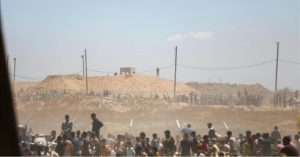

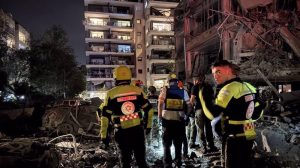
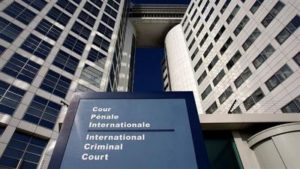
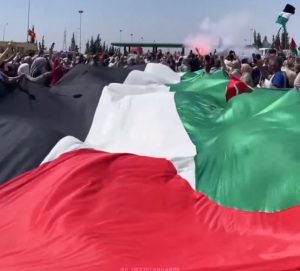

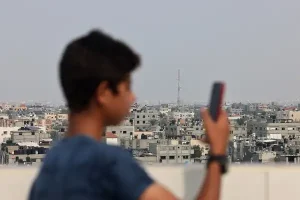



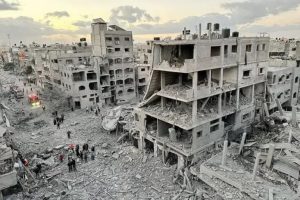
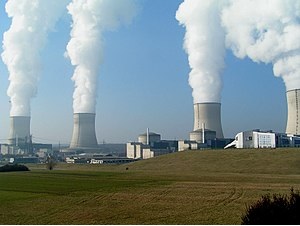
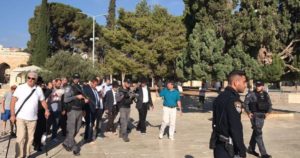





 Mina Indonesia
Mina Indonesia Mina Arabic
Mina Arabic